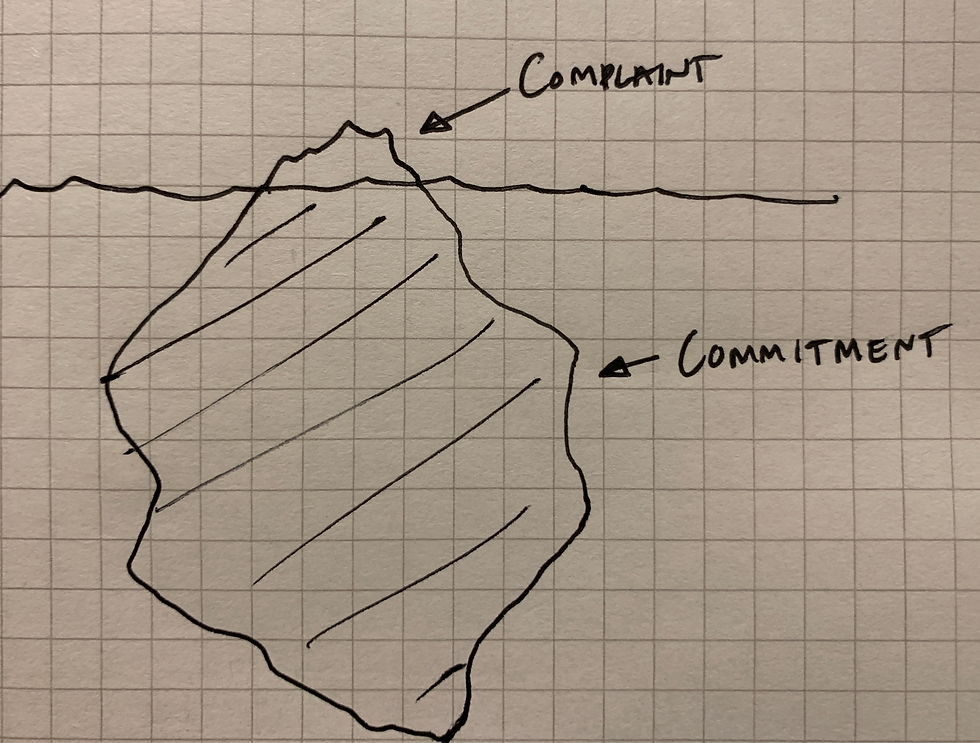How to Resolve Any Complaint
- Mick Scott
- Oct 23, 2022
- 3 min read
We complain because we’re committed to something, we have needs and yearnings, and we get mis-trained to think that complaining is a productive way to get what we're after.
If we didn’t have background, underlying commitments, needs, or yearnings, we wouldn’t complain.
This simple fact about our complaints is an access to freedom, insight, and effectiveness for ourselves and for our relationships with others. Here’s how:
Diffusing our own amateur complaints
It’s not our circumstances in life that give us problems - it’s our complaints about our circumstances.
Our complaints about our life - which are complaints about ourselves, others, or situations - are an expression of an underlying commitment, need, or yearning. These commitments, needs, and yearnings are important and valuable to us. We really care about them.
Mostly, though, we hang out in the complaint. Complaint energy is the energy of being a victim. It’s the energy of being “at the effect” instead of “at the source.”
It’s okay to start with a complaint, but don’t stay there.
Here's a simple, 4-step method to resolve any complaint:
Get clear on the specific complaint.
See the commitment behind your complaint.
Really see that complainer energy doesn't serve your commitment. Complainer energy is intended to help us avoid responsibility. So instead of complaining, choose whether to act proactively in service of your commitment or not.
If you’ve chosen to act proactively, go for it! When we take committed action, there’s no room for complaining. If you’ve chosen to not act, then stop complaining.
Being unfazed by other people’s complaints
The skill I’m about to share is literally giving me goosebumps (“truth bumps”) right now. I’ve been so moved when others have used this on me, and I’ve seen others get moved when I’ve used it on them.
If behind every complaint is a commitment, a need, or a yearning, then we can learn to hear others' complaints not for the tedious or offensive way they sometimes sound, but as an access to compassion and love for someone with deep commitments, needs, and yearnings.
Most of the time when we’re complaining, we’re only present to the surface level of the complaint. The complaint is the part of the iceberg above the surface of the sea.

When someone truly hears our commitment beneath the surface, however, it’s an almost magical experience. We experience being heard, being seen, and being understood. It’s powerful.
In other words, one access to diffusing others’ complaints (and our offense at being complained about!) is to speak directly to their commitment, not to their complaint.
This technique is sometimes called “active listening” or “recreating,” and it is profound and powerful (I’ve written about it before here).
After we’ve reflected back to someone what their underlying commitment is, we can then give them a gentle poke via a question: “What’s something you’d like to do to honor this commitment that matters so much to you?”
(Described in my post last week, here's a recent mantra of mine to remind me that it's not about the surface level complaint: "It's not about the dishes.")
Getting in touch with our underlying commitments helps diffuse complainer energy and shifts us into creative, proactive, and empowered energy. Doing this for ourselves is powerful, and doing this with others is a gift.
I invite you, dear reader, to be proactive and give up your complaints in service of your commitments.
And thank you thank you thank you for engaging with my work. ❤️
P.S. If you are interested in exploring how coaching with me can help you get beyond your complaints and into creative, inspired, and empowered action, schedule a free conversation with me and let’s connect. ❤️

Comments